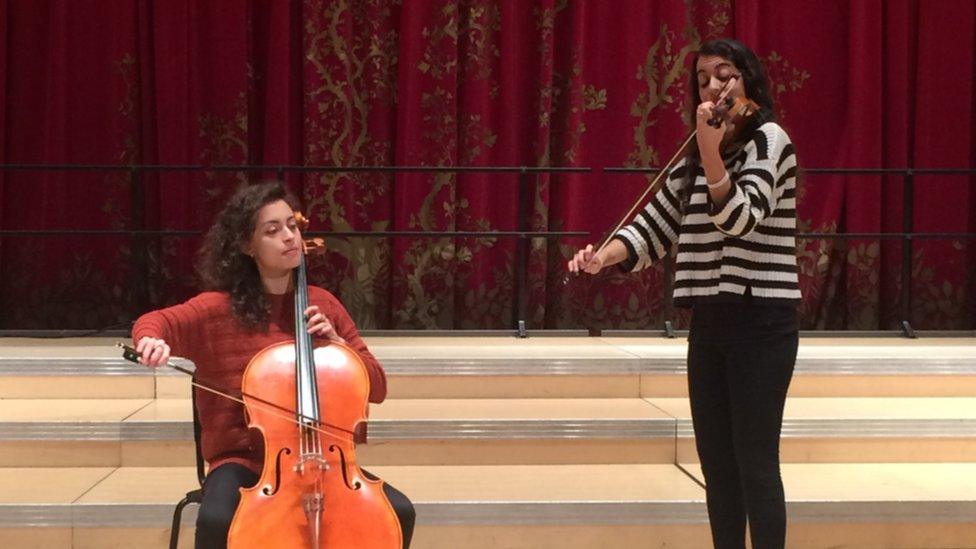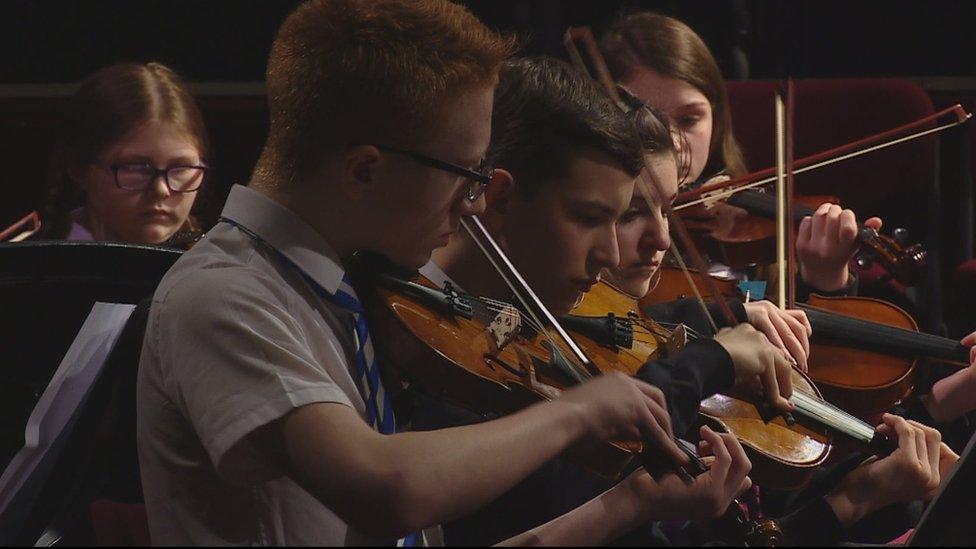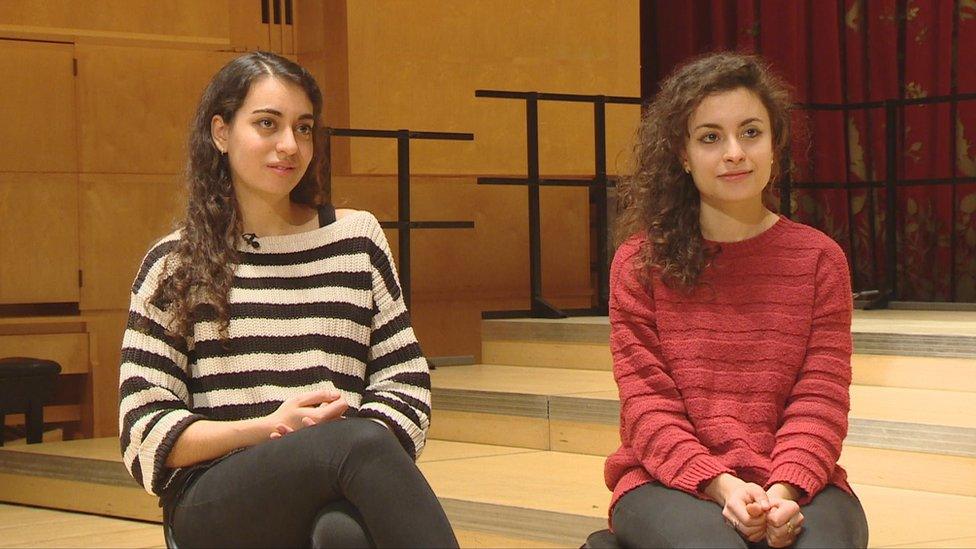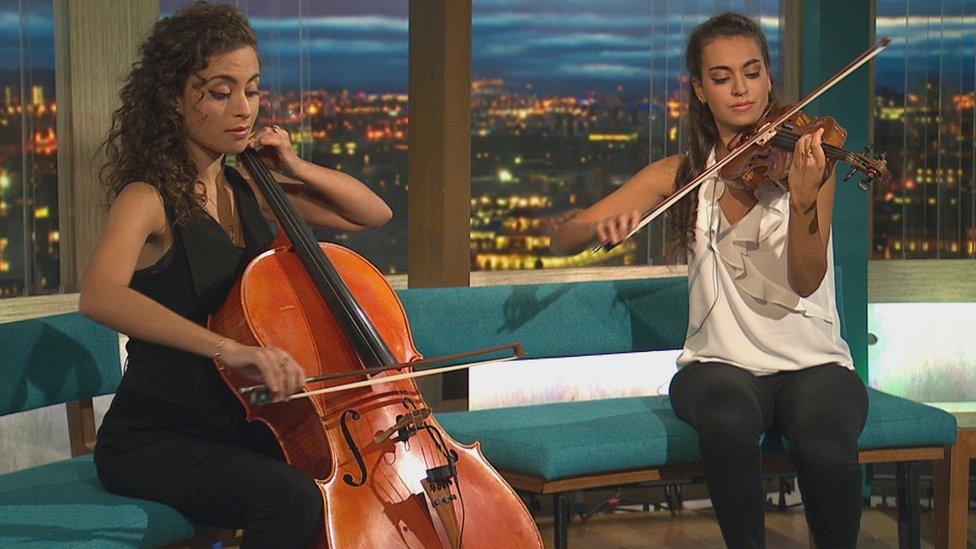Ayoub sisters back free music tuition in Scotland
- Published

Sarah and Laura Ayoub say their musical education in Scotland was crucial
Sarah and Laura Ayoub arrive at the Royal Conservatoire of Scotland, slightly flustered.
The train from their family home on the outskirts of Glasgow was cancelled and they had to dash - with cello and violin - to make our appointment.
But within minutes, they're composed and calm, playing a piece for our cameras.
At just 22 and 24, the Ayoub Sisters have already established themselves as a major force in the classical world.
They've collaborated with Mark Ronson, recording a classical version of Uptown Funk, external which they performed at the BRIT awards.
Their first album - recorded in a day at London's Abbey Road Studio - was released last October and immediately went to number one in the iTunes Official Classical Artists Album Charts.
It's only a short time ago that Sarah was studying music in this very building (Laura studied at the Royal College of Music in London) and that's why they're here today. Like many professional musicians, they believe their successful careers would not have happened without the music education they received in Scotland.
'Fully funded'
"It was hugely important to us," says Laura.
"Not only one-to-one lessons with really spectacular teachers but the whole environment, being able to play in an orchestra, sing in a choir, play in a chamber music group and get coaching on a weekly basis was really crucial to get an overall all encompassing understanding of classical music."
"I enjoyed singing, piano and violin and was lucky enough to learn them all but it's such a luxury to learn three different instruments and be fully funded to do them all. It's sad to think that some won't get that opportunity if they show interest in more than one."
In some parts of the country, even one instrument is a challenge. Highland Council is one of 22 local authorities who charge for music tuition. Earlier this month they transferred responsibility for the music tuition service to the arms length charity High Life Highland, including 55 music tutor posts.
Composer and fiddle player Duncan Chisholm learned his craft from an elderly crofter, but he also received subsidised lessons in school, and believes all children, wherever they live, should have access to music lessons without worrying about the cost.
"I think it will be a barrier," he says.
"Music is the heart of education, so important to the well being of children and social integration and it's unacceptable in 21st century Scotland that children can only get access to music if they can afford it. It's not acceptable at all."

Pupils from the string section of the Renfrewshire schools band
Of the ten local authorities who don't charge for music tuition, only one - Renfrewshire - has increased its spending. The council pledged £200,000 towards the cost of music tuition as part of Paisley's bid for UK City of Culture last year, and although they weren't successful, they're keeping their commitment.
Peter McLeod, director of children's services, said: "Clearly there are real pressures on local authorities and their budgets.
"Speaking for Renfrewshire, we have just been on a huge journey in terms of our bid for City of Culture 2021. We didn't quite make it in terms of the accolade but our journey continues and it's about cultural regeneration and we're proud of the ability to invest more in widening access and increasing participation.
"No child in Renfrewshire should be unable to develop a musical skill because they can't afford a musical instrument. That is not going to happen in this local authority. That is an exciting prospect."
It's a prospect which some areas can't even imagine. Clackmannanshire recently voted to double the cost of music tuition. With some exceptions, parents will now pay £524 a year.
West Lothian has just launched a consultation about its planned cuts. Dame Evelyn Glennie and Nicola Benedetti are among those backing a local campaign - Save Our Strings.
Allow X content?
This article contains content provided by X. We ask for your permission before anything is loaded, as they may be using cookies and other technologies. You may want to read X’s cookie policy, external and privacy policy, external before accepting. To view this content choose ‘accept and continue’.
Paolo Nutini and the composer, Patrick Doyle have also given their support to a nationwide campaign - Develop not Dismantle - which hopes to lobby headteachers and politicians on the importance of music education across Scotland.
The fear - expressed by the former head of the Royal Conservatoire of Scotland, John Wallace, - is that council music education services could "cease to exist" if cuts continue at the current rate.
The EIS teaching union has also expressed concern about a dramatic fall in the number of music teachers - from 1,100 to 640 over the past decade.
John Wallace leads MEPG - the Music Education Progress Group - which advises the Scottish government but many believe it's the government which needs to step in with a strategy and funding.
They, in turn, point to their investment in the Youth Music Initiative.

The Ayoub sisters want other young musicians to get free access to tuition
Speaking at the latest £1.6m launch in Edinburgh, Culture Secretary Fiona Hyslop said: "The Youth Music Initiative is primarily identified for primary schools, to ensure that every young person across Scotland, regardless of income will experience music tuition by the time they reach Primary 6. That's an important part of the national provision.
"Local authorities are responsible for their own local provision but what we have seen is that because of Youth Music Initiative at primary, many pupils arrive at secondary school with a real desire to play music. A
"A challenge we see is whether for that additional music tuition, there should be charging for it."
She added: "I'm very clear I don't think there should be but I'm also very understanding that these decisions are made by local councils responsible for their own budget."
Campaigners say in the current climate, that's not nearly enough. And it's not just the next generation of musicians who could be lost according to Sarah Ayoub.
"There are colleagues that I went to school with who are now the best dentists, doctors, entrepreneurs and lawyers. They went through all the grades, the competitions, the festivals and the lessons," she said.
"These students missed academic classes to go to flute lessons and they still excelled. I firmly believe musical education enhances your life and you don't have to become a musician to feel the benefits."
- Published7 October 2017

- Published25 January 2017
